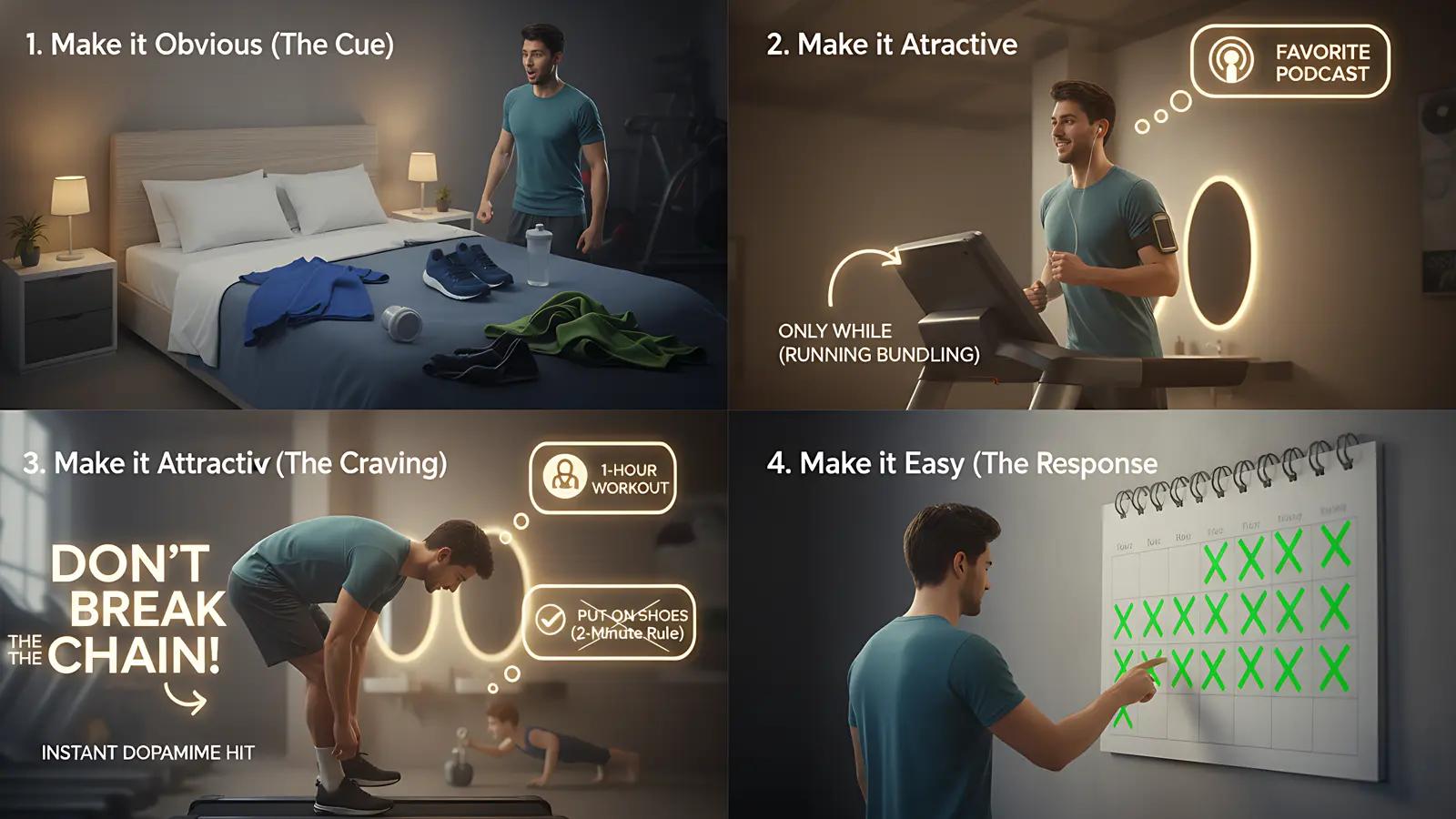Nutrition for Beginners: The 5 'Building Blocks' for a Fitter, Stronger You
Abs are 'made in the kitchen,' but what does that mean? This no-nonsense guide breaks down nutrition into 5 simple building blocks: Protein, Carbs, Fats, Water, and Consistency. No fads, just facts.

Introduction: You can't out-train a bad diet. It's the frustrating truth of fitness. You can spend hours in the gym, but if your nutrition isn't aligned with your goals, you'll just spin your wheels.
The good news? Nutrition doesn't have to be complicated. Forget the fad diets, the "miracle" supplements, and the confusing "superfoods." For 99% of people, success comes down to mastering 5 simple "Building Blocks."
Before You Start: The Law of Energy (Calories)
Before we get to the blocks, we must acknowledge the foundation. This is the non-negotiable law of thermodynamics:
- To Lose Fat: You must be in a Calorie Deficit (consume fewer calories than you burn).
- To Gain Muscle: You must be in a Calorie Surplus (consume slightly more calories than you burn, to fuel new muscle growth).
- To Maintain: You must be at Calorie Maintenance.
You don't need to obsessively track every calorie as a beginner, but you must respect this principle. You can't gain muscle on a starvation diet, and you can't lose fat if you're overeating.
Building Block 1: Protein (The 'Repair' Crew)
This is the most important block for fitness.
- Why It's King: Protein is made of amino acids, which are the building blocks for your muscle tissue. When you work out, you create micro-tears in your muscles. Protein repairs these tears, making the muscle stronger. It's also the most satiating nutrient, meaning it makes you feel full.
- How Much: A simple goal is to have a "palm-sized portion" of a protein source with 3-4 meals per day.
- Best Sources: Chicken breast, fish (salmon, tuna), eggs, Greek yogurt, tofu, lentils, beans, protein powder.
Building Block 2: Carbohydrates (The 'Energy' Crew)
Carbs are not the enemy. They are your brain's and muscles' #1 preferred fuel source.
- Why You Need Them: Carbs are stored in your muscles and liver as "glycogen." This is your body's high-octane fuel for your workouts. A low-carb diet is a low-energy diet.
- 'Complex' vs. 'Simple': Think "sustained fuel" vs. "fast fuel."
- Complex (Sustained): Oats, brown rice, quinoa, sweet potatoes, whole-wheat bread, fruits. These are great for all-day energy.
- Simple (Fast): White rice, bananas, sports drinks. These are actually great to eat right before or after a workout to refuel your muscles quickly.
- Best Sources: Oats, rice (all kinds), potatoes (all kinds), quinoa, fruits, vegetables.
Building Block 3: Fats (The 'Hormone' Crew)
Dietary fat does not "make you fat." It's a vital nutrient.
- Why You Need Them: Fats are crucial for hormone production (including testosterone and estrogen, vital for muscle growth), vitamin absorption (A, D, E, K), and protecting your organs.
- 'Good' vs. 'Bad': Focus on "unsaturated" fats. Limit (don't necessarily eliminate) "saturated" fats and avoid "trans" fats.
- Best Sources (Unsaturated): Avocados, nuts (almonds, walnuts), seeds (chia, flax), olive oil, fatty fish (salmon).
Building Block 4: Water (The 'Everything' Crew)
This is the most "underrated" performance enhancer.
- Why It's Vital: Your muscles are ~75% water. A 2% drop in hydration can cause a 10-15% drop in strength and performance. Water transports nutrients, lubricates joints, and regulates body temperature.
- The Simple Rule: Stop counting liters. Just look at your urine. You're aiming for a consistent "light straw" color. If it's dark, drink more.
Building Block 5: Consistency (The 'Secret Sauce')
This is the block that holds the others together.
- The 80/20 Rule: A "perfect" diet you follow for 3 weeks is worse than a "good enough" diet you follow for 3 years. Aim for 80% of your calories to come from whole, nutritious foods (the blocks above). The other 20% is for "soul food"—pizza, ice cream, a beer with friends.
- This 20% is what makes your diet sustainable. It's not "cheating"; it's planned flexibility.
Conclusion: Build Your Plate, Build Your Body
Stop overcomplicating it. At your next meal, look at your plate. Where is your protein? Where is your complex carb? Where is your healthy fat? Where is your veggie? If you can answer those questions, you're 90% of the way there.
Frequently Asked Questions (FAQ)
S: Do I need to track my macros (protein, carbs, fats)? C: As a beginner, no. It can be overwhelming. Start with the "Build Your Plate" or "Palm-Sized Portion" method. If you hit a plateau after 6-8 months, then tracking can be a useful tool to break through it.
S: What about supplements? C: 99% of supplements are a waste of money. The only ones most beginners should consider are: 1. Protein Powder (it's not a supplement, it's just convenient food) and 2. Creatine Monohydrate (safe, cheap, and the most scientifically-proven supplement for strength).
S: How soon before/after a workout should I eat? C: Don't stress the "anabolic window." Just try to have a carb/protein-focused meal 1-2 hours before your workout (for energy) and another 1-2 hours after your workout (for repair). Total daily intake matters more than precise timing.
Written by Daily Motivation Team
Sharing motivational content to inspire your journey to success.
Related Articles

The 'Consistency Code': How to Build a Workout Habit That Actually Sticks
Motivation fades, but habits endure. If you're tired of starting and stopping, this guide breaks down the science of habit formation (inspired by 'Atomic Habits') specifically for fitness.

Beat 'Gymtimidation': A Beginner's Guide to Overcoming Gym Anxiety and Building Confidence
Feeling like everyone is watching you at the gym? You're not alone. This is 'gymtimidation,' and it's the #1 reason people quit. Here’s a 5-step plan to walk in confident and get results.